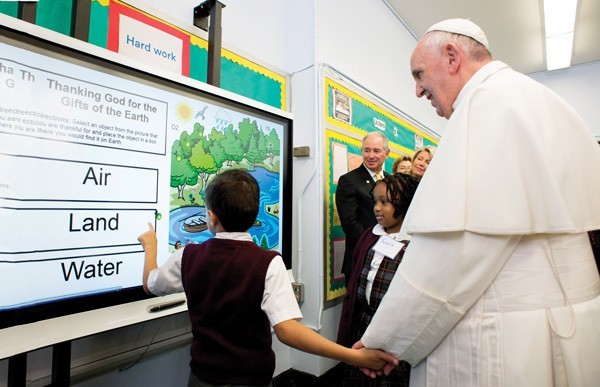By Anna Johnson, Seattle
This year has seen an enormous number of heart-breaking events happen around our Earth. From droughts and famine leading to starvation in East Africa, to the flooding which has killed over 1200 people in Bangladesh and India, it seems that every time I turn on the news, I’m hearing of new natural devastation.
Our Maryknoll missioners, who live and work around the world with people who are at the margins of our global society, have seen the effects of climate change for years: farmers are unable to get their normal produce to grow because of unseasonable rainfall or drought; the rising ocean waters have contaminated the previously safe drinking water sources of people living near the coasts; the droughts in Eastern Africa have led to famine and escalated violence, in part due to a lack of essentials such as water and food.

KENYA The road from Lodwar to Kakuma, Turkana. Desert landscape. photo by Sean Sprague
We are encountering more refugees, and more children suffering from malnutrition and other maladies. As we have grown to care deeply for these people with whom we have lived and worked for many years, we deeply care for the fate of our Earth, and our hearts break as further destructive results of our over-consumptive lifestyles come to light.
The release of Pope Francis’ encyclical on the environment, Laudato si’, was a joyful moment and a sigh of gratitude for many of us as new international attention was focused on the realities of climate change and that the impacts of our overburdened earth are felt most destructively and strongly on the people who are on the furthest margins of our world. Pope Benedict the XVI also wrote of our responsibility to care for creation, and it seems that Catholic conversation on this issue continues to grow.

Our US Church Engagement Division gathered recently for a week of deeply examining the current plight of the Earth in August, and from our experiences, lessons learned, and times of prayer, we grew to know what new steps we can take, from petitioning institutions to install solar panels and institute other environmentally responsible policies, to personal commitments to vegetarianism and rejecting consumerism, to working with our parishes and schools around environmental sustainability.
We know that the work is difficult, because in these times, we are called to make personal shifts in our daily habits and routines – this challenge will only be solved by personal and communal transformation, but the alternatives are far worse, and we’ve only seen the beginning of the horrendous results.

Minolta DSC
Yet as Pope Francis reminds us, “We must not think that these efforts are not going to change the world. They benefit society, often unbeknown to us, for they call forth a goodness which, albeit unseen, inevitably tends to spread.
Furthermore, such actions can restore our sense of self-esteem; they can enable us to live more fully and to feel that life on earth is worthwhile.” (Laudato Si 212).


Recent Comments